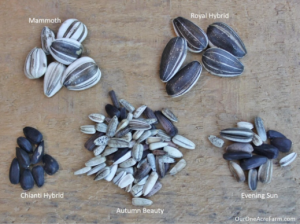2-Bad-Food-Habits GENIUS #2: Sunflower Seeds
- 24
- Sep
The post continues the “bad food habits” overview with a focus on sunflower seeds. These are my second favorite snack after popcorn. As a child I ate them shelled, but as an adult I usually eat them raw. This is a prevention topic on your HealMobile path to above-the-line health (per Nutrition and You data).
- Delicious, nutty and crunchy sunflower seeds or kernels are widely considered as health foods. They are high in energy, but may account for my belly fat, since 100 grams (4/5 cup) hold about 584 calories.
- The seeds are especially rich in linoleic acid, which constitutes over 50% of their fatty acids. Their mono-unsaturated oleic acid helps support the natural cholesterol balance in the blood.
- The kernels are an excellent source of protein, with quality amino acids such as tryptophan, which is essential for growth, especially in children. Just 100g of seeds provide about 21 g of protein (37% of daily-recommended values).
- They contain natural anti-oxidants such as chlorogenic acid, quinic acid, and caffeic acids, which help remove harmful oxidant molecules from the body. Further, chlorogenic acid helps reduce blood sugar levels by limiting glycogen breakdown in the liver.
- They are also a very rich source of Vitamin E, providing about 234% of RDA. Vitamin E is a powerful fat-soluble antioxidant, good for protecting mucus membranes and the skin.
Perhaps most important for a energetic woman like me, the kernels of the sunflower restore and build up my nervous energy. According to African Holistic Health, the adrenal glands take a hit due to the stresses of this fast-paced urban society, and “adrenal exhaustion” can be the result (Afrika, 2004). Even with my practice of Reiki, yoga and meditation to decompress and restore, I have been near that diagnosis.
SUNFLOWER SEEDS For My Last Nerve
I was also once told that I’m “borderline diabetic.” This is a common verdict for people of African descent, yet that alarming “you’ll need a prescription for insulin” judgment can be reversed.
This and perhaps other serious health problems have been forestalled by my “bad food habit”– crunching the sunflower seeds. I eat almost a cupful at one sitting, reading a book or watching a movie for example (instead of eating popcorn).
To me, it is not a snack, but lunch! Sunflower seeds contain micronutrients that enhance metabolism, digestion and a lot of the enzymic activity I need (Afrika, 75).
There is GENIUS data confirming this necessary stimulation, especially important for women. The seeds are among the finest sources of B-complex vitamins such as niacin (B3), folic acid (B9), thiamin (B1), pyridoxine (B6), pantothenic acid (B5), and riboflavin (B2).
-
- Folic acid — 100 g of kernels contains 227 µg of folic acid, which is about 37% of recommended daily intake. It’s essential for DNA synthesis.
- Niacin — about 8.35 mg or 52% of daily required levels of niacin is provided by just 100 g of seeds.
- Niacin helps reduce LDL-cholesterol levels in the blood. It enhances the amino acid GABA activity inside the brain, which in turn helps reduce anxiety and neurosis (has a tranquilizing effect).
Selection, Storage and Culinary Uses (details found here)
Maybe you garden or own land and grow the flower. Sunflower heads can be harvested once they turn brown and dry. In general, the seeds intended for confectionery use are larger, sweet, and have striped hulls. Oil-type kernels are characterized by small size, have more oil content, and feature black hulls. However, both types of seeds can be used for either purpose.
In the stores, choose whole-seeds, hulled or not. Avoid thin, shriveled seeds as they tend to be out of flavor. Although shelled sunflower seeds are used mainly to press cooking oil, they are still favored for use in candies and as bird feed. At home, store whole seeds at room temperature in a bin or jar.
I sprout organic sunflower seeds on my window sill and eat them raw or in salads. They can be added to any rice dish or casserole and added to baked breads, muffins and your own granola or cereal. Sunflower kernels should be placed inside an airtight container and stored in the refrigerator.
Sprout Your Seeds
- 1/2 – 1 cup fresh sunflower seeds
- 1 mason jar or large-mouth glass jar from which you can strain seeds easily (use cheesecloth if needed)
- soak seeds in water overnight in dark place (at least an inch above quantity)
- drain, rinse, but allow to sit in dark place again overnight; also allow excess water to drain and seeds to be separated rather than clumped.
- place seeds in sunlight for the next 2-3 days
- rinse and strain daily (morning and night okay)
- they should be sprouting by the third and fourth day
- scoop out, eat and enjoy.
–Rev. Niamo Nancy Muid
Notice:
This posts contains statements that have not been approved by the Food and Drug Administration, and are not intended to treat, diagnose, prescribe or cure any dis-ease or long-standing condition. See your physician or health care provider to assess any concerns.







